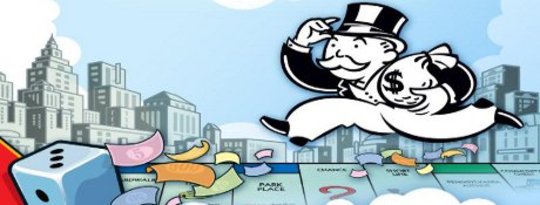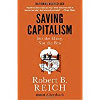
The biggest economic debate is between Keynesians (who want more government spending and lower interest rates in order to fuel demand) and supply-side “austerics” (who want lower taxes on the wealthy and on corporations to boost incentives to hire and invest, and who see government deficits crowding out private investment).
But both approaches have problems.
George W. Bush Tried Supply-Side Tax Cuts -- but Nothing Trickled Down
George W. Bush tried supply-side tax cuts but nothing trickled down. Jobs and wages declined. And austerity economics has been a disaster for Europe.
Unfortunately the U.S. is now adopting supply-side austerics by making the Bush tax cuts permanent for 98 percent of taxpayers, hiking Social Security taxes back up, and implementing the sequester.
I’m on the Keynesian side. Yet the biggest weakness of modern Keynesian economics is it doesn’t have a clear answer for how much spending is necessary in an economy, like ours, in which wages keep dropping and government debt keeps growing. Simply arguing “more” won’t cut it.
John Maynard Keynes urged that governments “prime the pump” to stimulate demand but pump priming has limited effect if the well is running dry.
Economic Debate Has Neglected The Scourge of Inequality
Both sides of the modern debate have neglected the scourge of widening inequality.
We’re now witnessing what happens when all of the economic gains go to the top, and the rest of the population doesn’t have enough purchasing power to keep the economy going.
Four years into a so-called recovery and we’re still below recession levels in every important respect except the stock market. A measly 88,000 jobs were created in March, and total employment remains some 3 million below its pre-recession level. Labor-force participation is its lowest since 1979.
Businesses won’t hire and expand unless they have more customers, but most Americans can’t spend more. Last Friday’s retail sales report showed sales down .4 percent in March. Consumer sentiment has fallen to its lowest level in nine months.
The underlying problem is the vast middle class is running out of money. They can’t borrow more — and shouldn’t, given what happened after the last borrowing binge.
Real annual median household income keeps falling. It’s down to $45,018, from $51,144 in 2010. All the gains from the recovery continue to go to the top.
Widening Inequality Is Not Inevitable. We Could Restore The Middle Class
Widening inequality is not inevitable. If we wanted to reverse it and restore middle-class prosperity, we could.
We could award tax cuts to companies that link the pay of their hourly workers to profits and productivity, and that keep the total pay of their top 5 executives within 20 times the pay of their median worker. And impose higher taxes on companies that don’t.
We could raise the minimum wage to half the average wage.
We could increase public investment in education, including early-childhood.
We could eliminate college loans and allow all students to repay the cost of their higher education with a 10 percent surcharge on the first 10 years of income from full-time employment.
We could expand the Earned Income Tax Credit.
And we could pay for all this by adding additional tax brackets at the top and increasing the top marginal tax rate to what it was before 1981 – at least 70 percent.
But none of this will happen until the public understands why widening inequality is so damaging. Even the rich would do better with a smaller share of a rapidly-growing economy than a large share of one that’s barely growing at all.
Our political leaders in Washington have for now chosen supply-side austerity economics over Keynesian economics. That’s bad enough. Their inability or unwillingness to do much of anything about the widening inequality will prove a larger problem.
*Sub-titles by Polyconundrum
About the Author
 ROBERT B. REICH, Chancellor’s Professor of Public Policy at the University of California at Berkeley, was Secretary of Labor in the Clinton administration. Time Magazine named him one of the ten most effective cabinet secretaries of the last century. He has written thirteen books, including the best sellers “Aftershock" and “The Work of Nations." His latest, "Beyond Outrage," is now out in paperback. He is also a founding editor of the American Prospect magazine and chairman of Common Cause.
ROBERT B. REICH, Chancellor’s Professor of Public Policy at the University of California at Berkeley, was Secretary of Labor in the Clinton administration. Time Magazine named him one of the ten most effective cabinet secretaries of the last century. He has written thirteen books, including the best sellers “Aftershock" and “The Work of Nations." His latest, "Beyond Outrage," is now out in paperback. He is also a founding editor of the American Prospect magazine and chairman of Common Cause.
Books by Robert Reich
Saving Capitalism: For the Many, Not the Few -- by Robert B. Reich
 America was once celebrated for and defined by its large and prosperous middle class. Now, this middle class is shrinking, a new oligarchy is rising, and the country faces its greatest wealth disparity in eighty years. Why is the economic system that made America strong suddenly failing us, and how can it be fixed?
America was once celebrated for and defined by its large and prosperous middle class. Now, this middle class is shrinking, a new oligarchy is rising, and the country faces its greatest wealth disparity in eighty years. Why is the economic system that made America strong suddenly failing us, and how can it be fixed?
Click here for more info or to order this book on Amazon.
Beyond Outrage: What has gone wrong with our economy and our democracy, and how to fix it -- by Robert B. Reich
 In this timely book, Robert B. Reich argues that nothing good happens in Washington unless citizens are energized and organized to make sure Washington acts in the public good. The first step is to see the big picture. Beyond Outrage connects the dots, showing why the increasing share of income and wealth going to the top has hobbled jobs and growth for everyone else, undermining our democracy; caused Americans to become increasingly cynical about public life; and turned many Americans against one another. He also explains why the proposals of the “regressive right” are dead wrong and provides a clear roadmap of what must be done instead. Here’s a plan for action for everyone who cares about the future of America.
In this timely book, Robert B. Reich argues that nothing good happens in Washington unless citizens are energized and organized to make sure Washington acts in the public good. The first step is to see the big picture. Beyond Outrage connects the dots, showing why the increasing share of income and wealth going to the top has hobbled jobs and growth for everyone else, undermining our democracy; caused Americans to become increasingly cynical about public life; and turned many Americans against one another. He also explains why the proposals of the “regressive right” are dead wrong and provides a clear roadmap of what must be done instead. Here’s a plan for action for everyone who cares about the future of America.
Click here for more info or to order this book on Amazon.



























